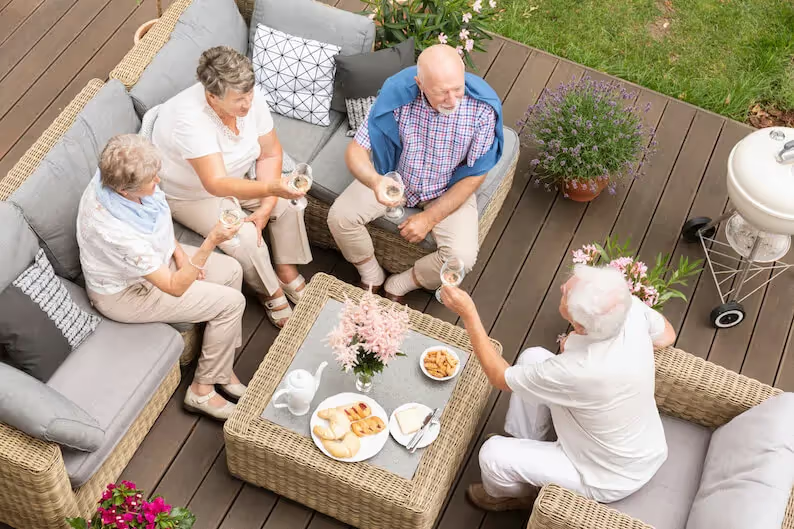Humans are inherently social. We rely on interaction and cooperation with others to survive and thrive. Research has even shown that our social behavior plays a significant role in our overall health. And that doesn't change the older we get. In fact, a healthy social life is quite important for seniors. There are many ways older adults can benefit from socialization. Continue reading to learn why socialization is important and how it can impact your life and health.
The Need to Socialize
If Covid-19 taught us anything, it proved just how important healthy relationships and social interaction are at every age. Everyone had to adjust. Many of us began to feel a sense of isolation and emptiness during quarantine. We longed for the day we'd be able to see our family and friends again. This was a similar feeling that several retirees have to experience. Older adults have difficulty transitioning from the workforce to retirement. That day-to-day interaction with colleagues had more of an impact on you than you probably ever thought. Interacting with other people and establishing relationships helps to make our lives feel more meaningful. In addition, it mentally, physically, and emotionally helps us.
Health Benefits of Older Adult Socialization
It's been shown that older adults who have a thriving social life tend to have fewer health issues and appear happier. Socialization in older adults can help to achieve the following: Reduced Stress – This alone has a massive impact on our health. Stress wreaks havoc on us both physically and mentally. Older adults who have a healthy and active social life tend to better handle stress and stressful situations. Less stress leads to better cardiovascular health and better overall health. Less Cognitive Decline – Socialization can offer a major boost to cognitive health. It helps to keep you mentally sharp and intellectually engaged. For example, one study found that Individuals who had frequent social connections experienced 70 percent less cognitive decline than those who had little interaction with others. Improved Mental Health – In addition to lowering stress and keeping your noggin sharp, socialization in older adults helps to combat depression. As seen during Covid-19, isolation brings about feelings of despair and loneliness. Being around people you enjoy and love instantly boosts your mood and makes you feel greater self-worth. Increased Accountability – No matter how old we get, we still value others' opinions and need to be held accountable. When left alone, it's easy to fall into temptation or develop bad habits, such as not exercising as much or eating food that may not be all that great for our health. But for aging adults, their social groups can be their accountability partners. If people are holding you accountable, you're much more likely to take care of yourself and want to prioritize your health and well-being. Longer Lifespan – If your health is better and you're happier, those alone will help you live longer. All the benefits of high levels of socialization combined help increase your longevity, paving the road for a long and happy life.
How to Create and Maintain a Healthy Social Life
Now that you know a few of the benefits of having an engaging social life, how can you develop a social circle that works for you? As previously mentioned, it can be difficult after retirement. When we are in the workforce, we don't have to work as hard to establish friendships and social interactions. However, it can be just as easy to cultivate a healthy social life even after you retire.
Family
If you have children and grandchildren, try to maintain positive relationships with them. The younger generations are certain to keep you on your toes and challenge you mentally.
Wellness Center/Group
Consider joining a senior wellness center or group. Many of these places or organizations offer exercise classes, arts and crafts, and even host social events to promote socialization. These activities help you meet new people and develop lasting friendships. Not to mention a lot of classes are geared around promoting positive health.
Volunteer
If you have the resources and are able, volunteer. Pick a charity or organization that means something to you and help out. Volunteer work is great for helping older adults find meaning and establish a routine, which is important in the later years.
Host
Host your own social gatherings. They don't have to be big elaborate parties but occasionally invite some friends over. Discuss the latest books you've read or just catch up and enjoy each other's company.
Stay Connected and Improve Your Health
You don't have to be the life of the party, but just by being part of the party, you can reap many benefits. Socialization in older adults is important for many reasons. Mentally, physically, and emotionally we are affected by the level of our social interaction. It can be intimidating and scary to go out and meet new people, but it can also be a lot of fun. Take advantage of the effortless opportunities you have to socialize. And if you have a close social circle, work to maintain it.




